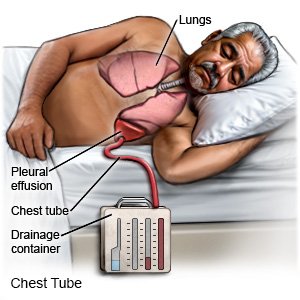Pleural Empyema
Medically reviewed by Drugs.com. Last updated on Aug 4, 2025.
What is pleural empyema?
Pleural empyema is pus-filled fluid in the pleural space. The pleural space is between your lungs and the inside of your chest cavity. A plural empyema can become a medical emergency that needs immediate treatment.
What causes or increases my risk for pleural empyema?
Pleural empyema is usually caused by pneumonia. The following are also causes:
- A bacterial infection, such as pneumonia or tuberculosis (TB)
- Surgery on your chest
- A lung abscess
- A lung disease, such as COPD or lung cancer
- A chest injury
- Thoracentesis (procedure to remove a fluid sample through a needle)
What are the signs and symptoms of pleural empyema?
- A dry cough, or shortness of breath
- Chest pain that gets worse when you breathe deeply
- Heavy sweating, or night sweats
- Fever and chills
- Weight loss without trying
How is pleural empyema diagnosed?
- Blood tests are used to find the bacteria or fungi causing your empyema. Blood tests may also show if the infection has spread to your blood or you have signs of inflammation.
- X-ray or CT scan pictures are used to find signs of pneumonia or a lung abscess. The pictures may also show fluid buildup in your lungs.
- Thoracentesis is a procedure used to remove a fluid sample from the pleural space. The sample is tested for the bacteria or fungi causing your empyema.
Related medications
How is pleural empyema treated?
- Antibiotics are usually given to treat a bacterial infection. This medicine is given to treat pneumonia. You may not get antibiotics if your empyema is not caused by pneumonia.
- A drain or chest tube may be placed to remove fluid from the pleural space.

- Thoracotomy is a procedure used to drain fluid from around your lungs and clean out pus and any scarring. Ask your healthcare provider for more information on this procedure.
- Surgery may be used to help your lungs expand more easily and fully.
What can I do to manage my symptoms?
- Do not smoke. Nicotine and other chemicals in cigarettes and cigars can cause lung damage. Ask your healthcare provider for information if you currently smoke and need help to quit. E-cigarettes or smokeless tobacco still contain nicotine. Talk to your healthcare provider before you use these products.
- Drink liquids as directed. Liquids can help soothe your throat if you have a dry cough. Liquids can also help relieve fluid buildup. Ask your healthcare provider how much liquid to drink each day and which liquids are best for you.
- Rest as needed. Rest can help your body heal. Rest is also important if you feel more tired than usual.
- Eat a variety of healthy foods. Healthy foods include fruits, vegetables, whole-grain breads, low-fat dairy products, lean meats, fish, and beans. You may need to eat more if you are losing weight without trying.
When should I seek immediate care?
- You have new or worsening symptoms, such as shortness of breath or chest pain.
When should I contact my healthcare provider?
- You have a fever.
- You have questions or concerns about your condition or care.
Care Agreement
You have the right to help plan your care. Learn about your health condition and how it may be treated. Discuss treatment options with your healthcare providers to decide what care you want to receive. You always have the right to refuse treatment. The above information is an educational aid only. It is not intended as medical advice for individual conditions or treatments. Talk to your doctor, nurse or pharmacist before following any medical regimen to see if it is safe and effective for you.© Copyright Merative 2025 Information is for End User's use only and may not be sold, redistributed or otherwise used for commercial purposes.
Further information
Always consult your healthcare provider to ensure the information displayed on this page applies to your personal circumstances.
